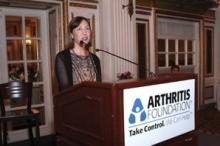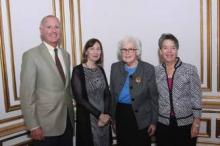Dr. Ellen M. Gravallese has had a trail-blazing and award-winning career in which she has straddled rheumatology to make contributions both to the bench and the bedside. Her accomplishments owe much to her joint abilities to focus on basic research that bears fruit in the form of meaningful clinical improvements in patient management and to foster the next generation of rheumatology investigators. But there has also been a place for serendipity in her trajectory.
As director for translational research at the Musculoskeletal Center of Excellence, University of Massachusetts Memorial Medical Center, Worcester, Dr. Gravallese’s research focuses on study of the pathogenesis of rheumatoid arthritis, with particular interest in the fundamental mechanisms of bone and cartilage destruction.
According to Dr. Michael Weinblatt, her longtime colleague, "Her research has changed our understanding of the disease, leading to a rethinking of the interaction of inflammation and erosion.
"Some of the erosive process in RA may not all be due to inflammation. It also results from the effect of osteoclasts on bone. The insight that treatment can reduce erosion even when it does not [affect] inflammation may lead to treatment advances," said Dr. Weinblatt, who is the John R. and Eileen K. Riedman professor of medicine at Harvard Medical School, Boston.
Specifically, research done in Dr. Gravallese’s lab has "definitively identified osteoclasts as the cell type responsible for bone destruction in RA, and RANKL as a critical cytokine produced by RA synovial tissues that drive osteoclastogenesis. Anti-RANKL antibodies, recently approved for clinical use, have already been shown to be effective in the prevention of bone destruction in osteoporosis and cancer," according to some biographic material."
"In addition, however, Dr. Gravallese is well known as an outstanding clinician and teacher. Physician-scientists who teach, see patients, and do research are often referred to as ‘triple threats,’ according to Dr. Robert W. Finberg, who was among those who recruited her to the University of Massachusetts 6 years ago.
Indeed, Dr. Gravallese is known to her colleagues as a triple threat plus a little something extra, "Ellen came highly recommended as a creative scientist who had made major discoveries in the area of bone research and the pathogenesis of joint destruction as a result of rheumatoid arthritis. She is internationally known for her contributions to the field of rheumatology," he said. Dr. Gravallese’s achievements prompted one of her colleagues to refer to her as a ‘quadruple threat,’ with expertise in research, clinical medicine, teaching, and service to her profession," said Dr. Finberg, who is chair of the department of medicine at University of Massachusetts where Dr. Gravallese is also professor of medicine and cell biology.
Dr. Gravallese began to test the waters and to challenge the status quo in the patriarchal education system when she was a young student, according to Dr. Katherine Upchurch.
"While in the eighth grade, she sought to single-handedly overturn single-sex education at the then all-male Phillips Academy, in Andover, Mass., where her brothers had gone. She met with the director of admissions at PA to advocate for herself, but it was not to be. I surmise that this may be her only academic failure to date," Dr. Upchurch told an audience the night that Dr. Gravallese won the Marion Ropes Physician Achievement Award from the Arthritis Foundation in 2011.
Dr. Gravallese, the daughter and sister of physicians, was not thinking about a career in rheumatology, much less leading research that may change the management of RA, when she was in medical school. "While in my fourth year of medical school, I had the opportunity to spend a 1-month rotation in Cooperstown, N.Y., at the Mary Imogene Bassett Hospital, which is a community hospital closely associated with Columbia University, N.Y. I had only 1 month open in my schedule for a rotation there, and because I signed up late, there was only one rotation available, which was rheumatology. I must admit it was not my top choice at the time for a clinical rotation."
On such matters of chance an entire professional life can be based.
"However, I was fortunate to work with Dr. Gary Hoffman, who at that time was a young rheumatologist in community practice. I worked side by side with Dr. Hoffman for the entire month, and was fascinated by the patients I saw and was struck by the fact that so little was known about the pathogenesis of their diseases. Dr. Hoffman was such an inspiring mentor," she said in an interview.



